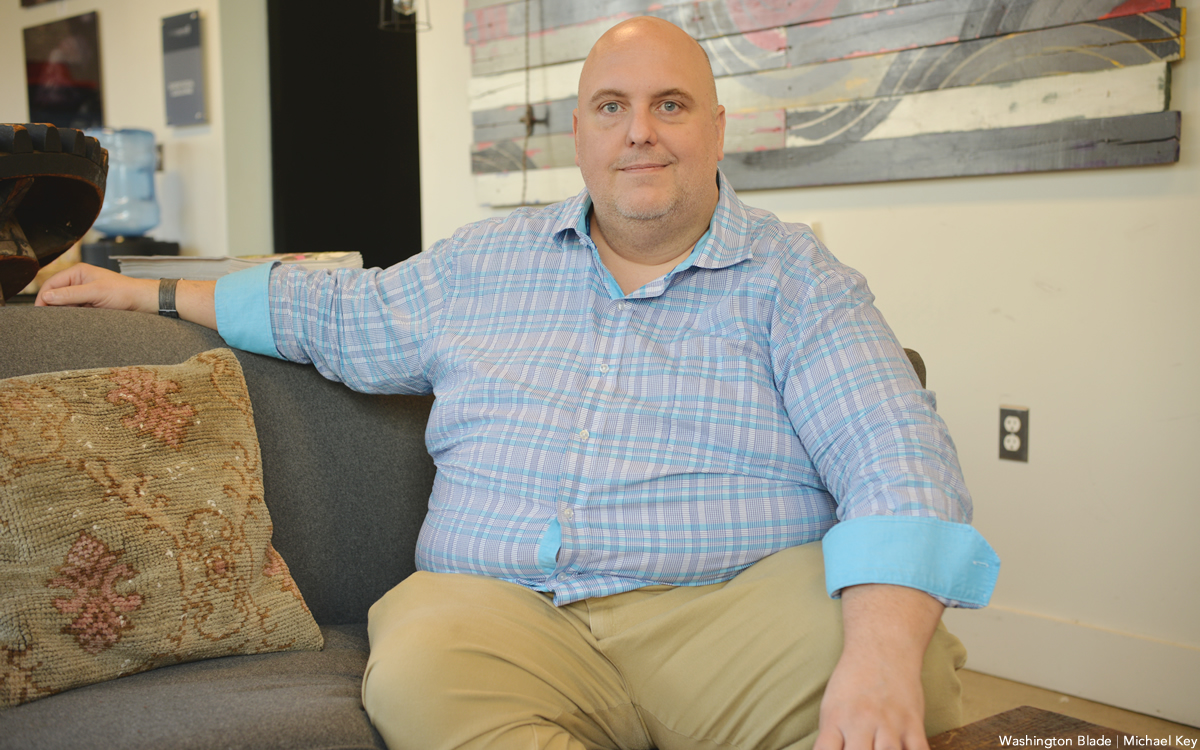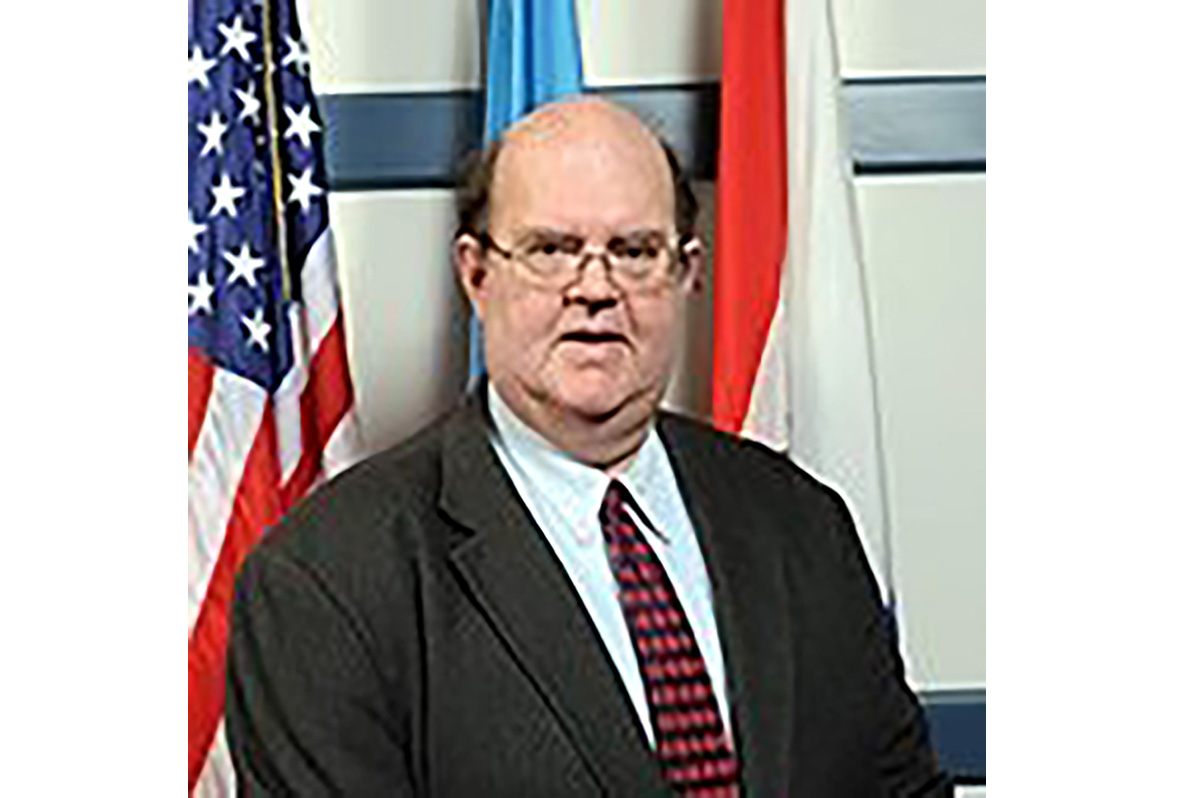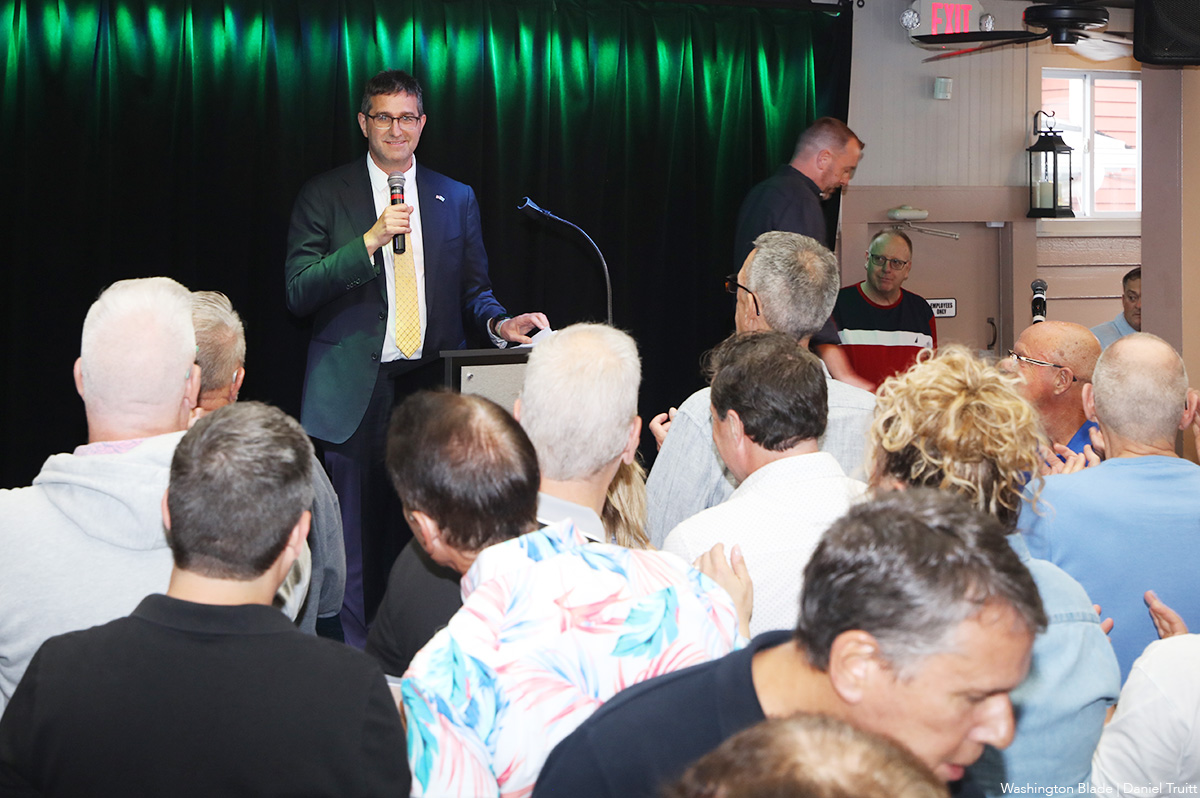Delaware
Former CAMP Rehoboth director launches Sussex Pride
Non-profit to focus on ‘the folks who really need help the most’

Sussex Pride, a new LGBTQ organization based in southern Delaware, announced its official launch last Friday in a press release from its founding board of directors. The nonprofit looks to serve Sussex County and the state as a whole through yearlong LGBTQ programming and advocacy.
David Mariner, Sussex Pride founder and director, began to conceptualize the organization after noticing disparities in access to LGBTQ resources among different communities in Sussex County.
While Rehoboth Beach already has resources for LGBTQ community members, that is not the case for the entire county, he said. Many areas surrounding the beachside hub experience the “greatest need” for advocacy and resources, yet face the largest accessibility barriers.
“What I wanted to do is connect with some amazing activists from across the county, and really see: Is there a way we could create a new organization that centers the needs of those folks,” he said.
The organization’s board of directors includes members from different backgrounds who can help contextualize the diverse experiences of LGBTQ community members across the county, he added.
For Sussex Pride, recognizing and addressing the needs of underrepresented communities also means speaking with individuals from those communities directly. The organization will conduct a county-wide assessment to determine areas of community need, paying particular focus to the needs of “LGBTQ youth, transgender and nonbinary individuals, LGBTQ People of Color, LGBTQ seniors, and those living in more rural areas of our state,” the press release read.
Mariner launched Sussex Pride shortly after stepping down from his role as executive director of nearby LGBTQ nonprofit CAMP Rehoboth on May 31 — a position he began in 2019. According to Mariner, Sussex Pride is interested in working with CAMP Rehoboth in the future.
“I enjoyed my time at CAMP Rehoboth,” he noted. “I certainly hope there’s opportunities for us to collaborate.”
Wesley Combs, president of CAMP Rehoboth, echoed Mariner’s sentiments, noting that he hopes the two organizations will have a collaborative relationship.
“We welcome more support for the LGBTQ community in Delaware and look forward to learning more about what Sussex Pride will be doing,” he said. “We are always interested in partnering with other organizations who share our values and are committed to creating a more positive Rehoboth as well as a more positive Sussex County and beyond.”
Jamie McKenna, a Sussex Pride board member, noted that bringing a new LGBTQ organization to Sussex County is not an indictment against those already in place, but instead a way to expand resources and make them more accessible. “I don’t think any one organization can adequately represent our entire community,” she said.
Kathy Carpenter Brown, another Sussex Pride board member, noted that there is currently a lack of trans-specific resources among local LGBTQ organizations, which the new nonprofit hopes to remedy.
In 2017, Carpenter Brown founded Rehoboth TransLiance, a social group for transgender and gender diverse individuals in the Rehoboth Beach area. Through social events and educational resources, the organization has worked to create space for gender diverse Delawareans in areas where, previously, it might not have existed.
Carpenter Brown noted that her involvement with the organization led Mariner to invite her to get involved with Sussex Pride. When asked to join the organization, “I brought a few friends along with me,” she added, referring to other trans women on the board of directors.
Rehoboth TransLiance will now find a home as a subgroup of Sussex Pride, working on the forefront of its trans-specific programming, Carpenter Brown said. The organization will continue to create events and resources for the Sussex County trans community, and has secured an office and meeting space in a local church, she added.
When it comes to Sussex Pride’s motivations for creating trans-specific resources, “I don’t think it’s useful to look at it as [doing] what CAMP Rehoboth doesn’t do,” McKenna added. “Almost nobody does it anywhere, and we’re trying to bring something new or, at least, something relatively rare.”
For Carpenter Brown, the top priority in supporting local trans community members is clear: creating a local trans-inclusive and gender-affirming healthcare facility. She pointed to the attention TransLiance’s table at Delaware Pride received as evidence of a deep community need for trans-specific education and healthcare resources.
“There are so many people out there with questions, so many people looking for support, and they just don’t know where to find it,” she explained. “I know this area is known as a liberal area … but we really have no resources.”
“We don’t have the healthcare that we need. We don’t have the education that we need,” she added. “We don’t have the doctors, therapists and psychologists and all the things that the state and federal government requires us to have in order to get the healthcare we need.”
McKenna echoed Carpenter Brown’s sentiments, noting that the barriers she experiences accessing healthcare might outright prevent other trans individuals from accessing important medical services.
“I go up to Philadelphia to get my hormones, my basic medical care. There’s really nowhere around here that people can go,” she explained. “I’m lucky enough to have the resources where I can get up there, but a lot of people around here don’t. If you’re some 19-year-old trans kid just coming out, you might as well be on the moon trying to get care out here.”
Nicholas Lee, another Sussex Pride board member, noted that living in Lewes, Del., has made accessing LGBTQ resources in Rehoboth Beach more challenging, even though the two towns are in the same county. “We don’t have the best transportation system,” and “we don’t have a particular central location,” he explained.
Carpenter Brown said that she would like to create the healthcare facility as well as a trans community center in Georgetown, Del. — a location central to the county and more accessible to those from rural areas than coastal towns.
“When the opportunity came to set up a nonprofit that can help all Sussex County, I got excited,” Lee said. He noted that the name ‘Sussex Pride’ demonstrates the organization’s underlying goal to help “the whole entire community,” which requires “broadening” current LGBTQ resources to more directly consider the needs of local rural communities.
“I think in the big picture, it’s important to have an organization that people feel welcome in, in terms of the whole community,” he added.
While the nonprofit is still in the early stages of development, it has a “wonderful group of people who are now donating monthly to sustain its work,” Mariner said. The organization will also be “looking at a wide variety of funding sources in the near future.”
Mariner pointed to the experiences of a young woman he met last year as further evidence of a deep need for LGBTQ resources in rural communities across Sussex County.
“Her family discovered that she was a lesbian and kicked her out of their home. For a couple months, they didn’t talk to her,” he explained. “I’m not familiar with that happening in Rehoboth Beach, but I know it happens in other parts of the county on a regular basis.”
For Mariner, it is stories like those that affirm the importance of Sussex Pride — an organization that will focus on “the folks who really need help the most.”
Sussex Pride will host its first in-person event, a bus trip to the New York City Pride Parade, on June 26. For more information, visit sussexpride.org.
Delaware
Delaware’s first openly gay elected official dies at 66
John Brady remembered as dedicated public servant

John Brady, the first openly gay elected official in Delaware, passed away in his home on Aug. 10 at age 66 after battling a long illness.
Brady was a deputy attorney general and was elected to three Sussex County offices: register in chancery, recorder of deeds, and clerk of the peace.
While clerk of the peace, Brady performed the first legal same-sex marriages in the state starting in July 2013. He told a local radio station just last week that he performed more than 400 marriages in his four-year term.
“John married my husband and me on the beach in Rehoboth 11 years ago,” said Washington Blade editor Kevin Naff. “He took great time and care in crafting our nuptials. It was a beautiful moment we will never forget. John was a pioneer for the LGBTQ community in Delaware, a dedicated public servant, and a gentleman. He will be missed.”
The day before he passed away on Aug. 9, former Speaker of the House Pete Schwartzkopf and former Lt. Gov. Bethany Hall-Long presented Brady with Delaware’s highest civilian honor for individuals who meet a high standard for community service, the Order of the First State.
Brady retired in 2024 after 32 years as a member of the Delaware Bar and 16 as a state employee. He was also active in the Eagle Scouts, working as a Scout leader and professional scouter. He received the Founder’s Award in 2023, one of the highest honors.
“Delaware mourns the passing of John Brady, a true public servant, trailblazer, and dear friend to many,” Gov. Matt Meyer wrote in a statement on Aug 11. “From his dedication to justice and service through the law to the barriers he broke as Delaware’s first openly gay elected official, John fought with compassion to improve our state and touched countless lives in the process. Lauren’s and my prayers are with John’s family and friends, as we all mourn his passing and celebrate his extraordinary life.”
Delaware
Del. att’y gen’l among plaintiffs suing Trump over access to care for trans youth
Coalition of states filed motion last week

A coalition of more than a dozen states, including Delaware, filed a lawsuit on Aug. 1 to block the Trump administration’s efforts to restrict access to medically necessary care for transgender youth.
Filed in federal court in Massachusetts, the lawsuit challenges Executive Order 14187 from January, in which President Donald Trump refers to gender-affirming care such as puberty blockers, hormone therapy, and surgeries as “mutilation.” It declares that the policy of the United States will be to “not fund, sponsor, promote, assist, or support the so-called ‘transition’ of a child from one sex to another, and it will rigorously enforce all laws that prohibit or limit these destructive and life-altering procedures.”
The suit argues that the EO violates the Administrative Procedure Act (APA) and the Tenth Amendment by asserting federal overreach into state-regulated medical and healthcare decisions.
“It becomes clearer every day that there simply is no bottom to this administration’s cruelty,” said Attorney General Kathy Jennings in a press release. “With his agenda failing and his popularity plummeting, the president is turning to time-tested tactics of demagogues: turning vulnerable people into scapegoats, obsessing over their private lives, and intruding on medical decisions. These stunts make kids into political props and do nothing to help Americans. They are despicable, dangerous, and illegal.”
Gov. Matt Meyer recently signed an executive order making Delaware a shield state for providers of gender-affirming care. It prohibits state agencies from cooperating with investigations, subpoenas, or legal actions by other states against individuals or providers involved in care that is legal in Delaware.
According to the press release, providers in some states have begun to reduce or eliminate services due to federal actions. Nemours Children’s Hospital in Delaware is no longer providing gender-affirming care to new patients.
Medical experts and nearly every major national medical association endorses and supports the availability of gender-affirming care for transgender young people.
“Empirical evidence has demonstrated that trans and nonbinary gender identities are normal variations of human identity and expression,” the American Medical Association said in 2021.
Plaintiffs include the attorneys general of California, Connecticut, D.C., Hawaii, Illinois, Maine, Massachusetts, Maryland, Michigan, Nevada, New Jersey, New Mexico, New York, Rhode Island, and Wisconsin, and the governor of Pennsylvania.
Delaware
Intersex actor, advocate River Gallo attending screening event in Delaware
Afternoon includes screening of ‘Every Body’ and Q&A

Intersex actor and advocate River Gallo will attend a screening of their film “Every Body,” followed by a Q&A in Wilmington, Del. this Saturday.
River Gallo is a Salvadoran-American filmmaker, actor, writer, model, and intersex rights activist from New Jersey. They wrote, directed and starred in the 2024 film “Ponyboi,” the first film to feature an openly intersex actor playing an intersex person. Intersex refers to individuals who are born with reproductive or sexual anatomy that doesn’t fit the typical definitions of male or female.
The movie that will be shown at Theatre N in Wilmington on July 26 at 4 p.m., “Every Body,” documents the lives of three intersex people, including Gallo. Following the film, Gallo will engage in a Q&A to discuss their life as the child of immigrant parents, activism, and film career. The event is hosted by Orgullo Delaware and the Delaware Sexuality and Gender Collective. ACLU Delaware and InterAct are partners in the event.
Noah Duckett co-founded Orgullo Delaware in 2019 with his mom, Julissa Coriano, to provide resources for Latino LGBTQ Delawareans and their families.
Duckett said that a lot of times, intersex people are left out of conversations surrounding the LGBTQ community. He hopes to pack the house for this event and emphasize how special it is that Gallo will be there in-person to connect with the audience about their work.
“I’m really hoping that people will be able to gain more of an understanding of what it must be like to navigate the world as an intersex person,” he said.
Mike Brickner, executive director of the ACLU of Delaware, seconded that the intersex community typically does not get as much spotlight within the LGBTQ umbrella.
“I hope that there are members of the intersex community that do come, that they also feel seen and acknowledged,” he said. “There’s often so few spaces for people to talk about that community and to really share about their experiences, so I do hope that visibility brings some level of comfort to folks.”
InterAct is an organization dedicated to the rights of intersex youth. It was initially founded with the goal of bringing legal action against the practice of non-consensual surgeries on intersex infants, according to Maddie Moran, the director of communications.
Moran said intersex people have historically been victimized and targeted by the government, by medical institutions, and by legal institutions. They said the average politician can’t even define intersex.
“Many of the average people in society don’t know that intersex people exist, and don’t understand that sex is not as strict as an XX and XY binary. It’s so much more than that,” they said.
Moran said they came out publicly as intersex before working with InterAct, but suddenly didn’t feel so alone after joining. They said that visibility is more critical now than ever and Gallo is just one of the people stepping up to be that visibility in the intersex movement.
“To intersex young people out there, you’re really not alone,” Moran said. “There are so many people who share your experiences, who share similar stories to yours, and regardless of what you’ve been told, there are many, many people out there like you.”
Brickner has come to the conclusion that the only way to get through the country’s current moment is through real and authentic solidarity.
“We have to acknowledge other people’s identities,” he said. “We have to have events like this that acculturate people to those identities, and that’s how we really create understanding and true, authentic solidarity with our broader community, is if people understand one another and see their lived experiences.”
-

 Health5 days ago
Health5 days agoCMS moves to expand HIV-positive organ transplants
-

 State Department4 days ago
State Department4 days agoFOIA lawsuit filed against State Department for PEPFAR records
-

 Opinions4 days ago
Opinions4 days agoTrans sports bans rooted in eugenics
-

 India4 days ago
India4 days agoTrans students not included in new India University Grants Commission equity rules




















